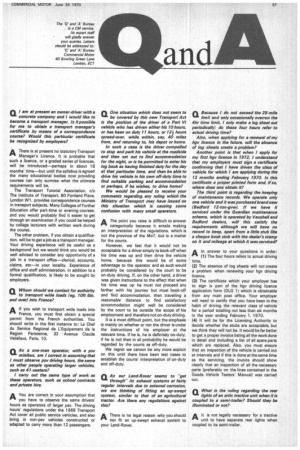Q One situation which does not seem to
Page 59

If you've noticed an error in this article please click here to report it so we can fix it.
be covered by this new Transport Act is the position of the driver of a Part VI vehicle who has driven either his 10 hours, or has been on duty 11 hours, or 121 hours spread-over, while within, say, 40 miles from, and returning to, his depot or home.
In such a case is the driver compelled to stop and park his vehicle at the roadside and then set out to find accommodation for the night, or is he permitted to enter his log book as having finished duty for the day at that particular time, and then be able to drive his vehicle in his own off-duty time to find suitable parking and accommodation or perhaps, if he wishes, to drive home?
We would be pleased to receive your comments regarding any ruling which the Ministry of Transport may have issued on this situation which is causing some confusion with many small operators.
AThe point you raise is difficult to answer
categorically because it entails making an interpretation of the regulations, which is not the province of the MoT, but is a matter for the courts.
However, we feel that it would not be acceptable for a driver simply to book-off when his time was up and then drive the vehicle home, because this would be of some advantage to the operator and as such would probably be considered by the court to be on-duty driving. If, on the other hand, a driver was given instructions to the effect that when his time was up he must not proceed any farther with his journey but must book-off and find accommodation, then travelling a reasonable distance to find satisfactory accommodation might well be considered by the court to be outside the scope of his employment and therefore not on-duty driving.
It is a most difficult point, but the emphasis is mainly on whether or not the driver is under the instructions of his employer at the relevant time. If he is, he is definitely on-duty, if he is not then in all probability he would be regarded by the courts as off-duty.
We regret we cannot be any more explicit on this until there have been test cases to establish the courts' interpretation of on-duty and off-duty.






















































































































